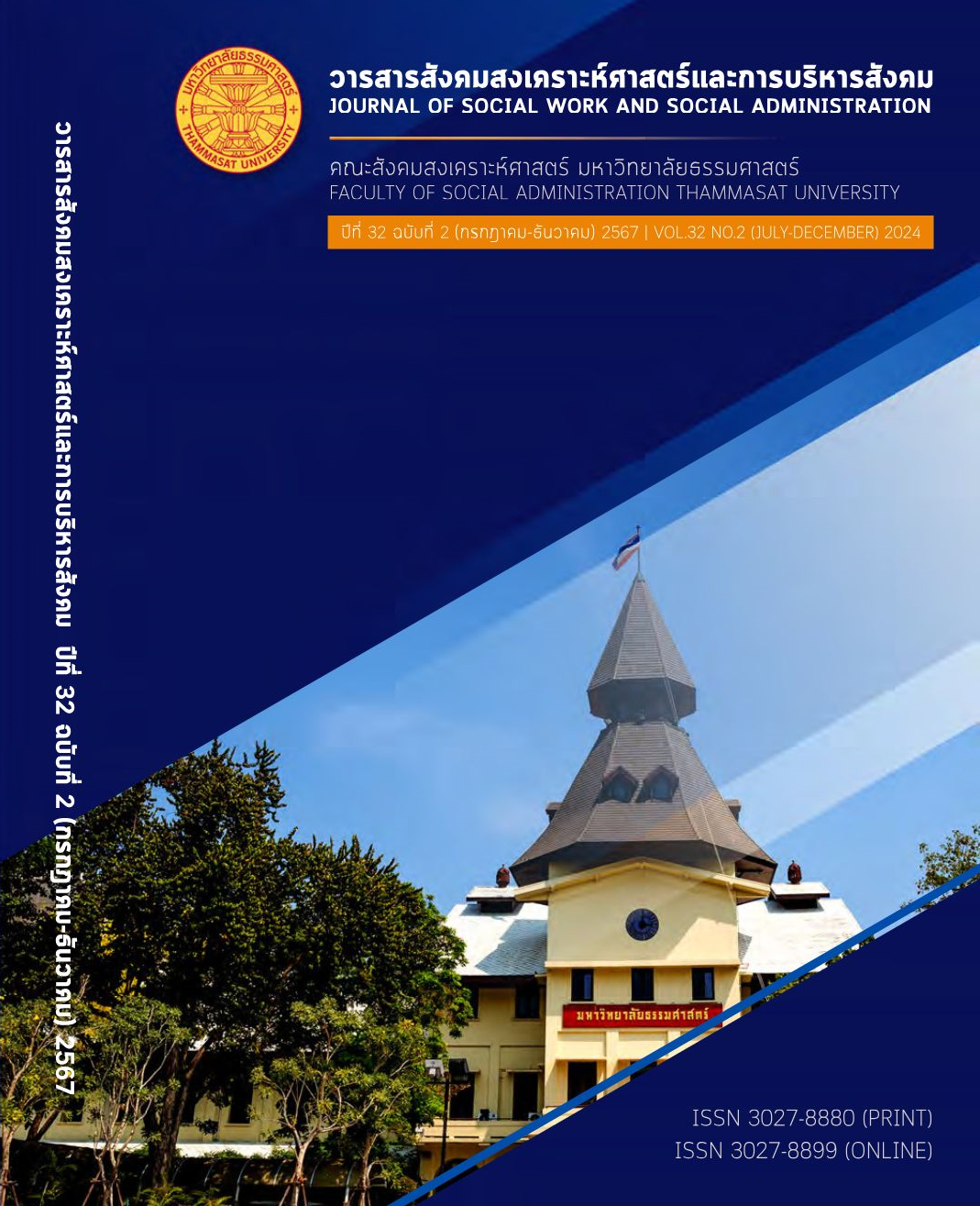Discrimination Against LGBTQ+ Inquiry Officers
Keywords:
Discrimination, LGBTQ+ inquiry officers, Royal Thai PoliceAbstract
This research aims to analyze the issue of discrimination against LGBTQ+ inquiry officers. It also offers an approach to resolution for addressing these issues. The research employs qualitative methods, including document analysis and in-depth interviews with key informants from five groups, totaling 31 participants: 11 LGBTQ+ inquiry officers, 5 heterosexual male or female inquiry officers, 5 supervisors, 5 subordinates, and 5 members of the public who accessed services. The findings reveal two main problems in treatment: 1) discrimination based on gender identity in the workplace, including verbal abuse and the use of derogatory terms, and 2) obstruction of career opportunities, impacting the mental health of LGBTQ+ inquiry officers, leading to stress and emotional issues. Additionally, the research finds that LGBTQ+ inquiry officers desire the following actions from organization: 1) the development and adjustment to the guidelines or standards to protect and support them, 2) the establishment of equality and fairness within the organization, 3) the clearly practices for addressing issues of treatment towards LGBTQ+ inquiry officers, and 4) the creation of an inclusive organizational culture that accepts gender diversity. These suggestions lead to the formulation of clear guidelines for managing treatment issues, as well as the development of organizational culture and appropriate mechanisms to prevent discriminatory treatment, fostering an open and accepting environment for inquiry officers with diverse gender identities within the organization.
References
American Psychological Association. (2011). Guidelines for Psychological Practice with Lesbian, Gay, and Bisexual Clients. Washington,
DC: APA. Retrieved January 1, 2024, APA. Retrieved from https://www.apa.org/pi/lgbt/resources/guidelines
Burke, M. (1994). Homosexuality as Deviance: The Case of the Gay Police Officer. British Journal of Criminology, 34(2), 192-203. Retrieved from https://doi.org/10.1093/oxfordjournals.bjc.a048402
Cox, T. H. Jr. (1993). Cultural Diversity in Organizations: Theory, Research and Practice. Oakland: Berrett-Koehler.
Erikson, E. H. (1968). Identity: Youth and Crisis. New York: Norton & Company.
Herek, G. M. (2009). Hate crimes and stigma-related experiences among sexual minority adults in the United States: prevalence estimates from a national probability sample. Journal of Interpersonal Violence, 24(1), 54-74. Retrieved from https://doi.org/10.1177/0886260508316477
International Labour Organization. (2015). Discrimination at work on the basis of sexual orientation and gender identity: Results of the ILO’s PRIDE Project. Geneva: ILO. Retrieved January 1, 2024, ILO Library, from https://www.ilo.org/resource/brief/discrimination-work-basis-sexual-orientation-and-gender-identity-results
Jones, M., & Williams, M. L. (2013). Twenty years on: lesbian, gay and bisexual police officers' experiences of workplace discrimination in England and Wales. Policing and Society, 25(2), 188-211. Retrieved from https://doi.org/10.1080/10439463.2013.817998
Lyons, P. M., DeValve, M. J., & Garner, R. L. (2008). Texas Police Chiefs’ Attitudes Toward Gay and Lesbian Police Officers. Police Quarterly, 11(1), 102-117. Retrieved from https://doi.org/10.1177/1098611107302655
Tajfel, H., & Turner, J. C. (1979). An Integrative Theory of Intergroup Conflict. In W.G. Austin & S. Worchel (Eds.), The Social Psychology of Intergroup Relations (pp. 33-47). California: Brooks/Cole Publishing Company.
The Yogyakarta Principles. (2007). Yogyakarta Principles and the Yogyakarta Principles plus 10. Retrieved January 1, 2024. Yogyakarta Principles, from http://www.yogyakartaprinciples.org
UNDP. (2019). United Nations Development Programme Annual 2019. New York: United Nations Development Programme.
United Nations. (2012). Born Free and Equal: Sexual Orientation and Gender Identity in International Human Rights Law. New York: United Nations. Retrieved January 1, 2024, UNHCR, from https://www.ohchr.org/sites/default/files/Documents/Publications/BornFreeAndEqualLowRes.pdf
World Professional Association for Transgender Health. (2011). Standards of Care for the Health of Transsexual, Transgender, and Gender Nonconforming People. Retrieved from https://www.wpath.org/media/cms/Documents/SOC%20v7/SOC%20V7_English.pdf
Downloads
Published
How to Cite
Issue
Section
License
Copyright (c) 2024 Journal of Social Work and Social Administration

This work is licensed under a Creative Commons Attribution-NonCommercial-NoDerivatives 4.0 International License.
The manuscripts published in the Social Work Journal is the copyright of the Social Work Journal, Thammasat University
Any article or opinion appeared in the Social Work Journal will solely be under the responsibility of the author The Faculty of Social Administration, Thammasat University and the editors do not need to reach in agreement or hold any responsibility.



